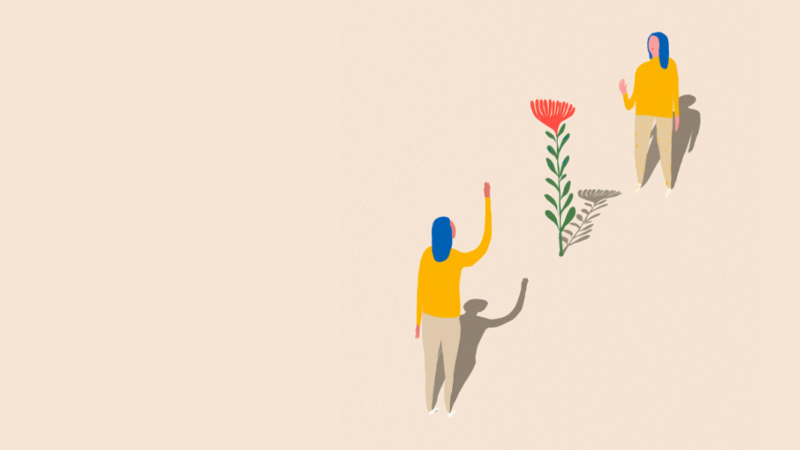Speed Is the Enemy of Depth
Right before the holidays, I had the opportunity to interview author and business philosopher Peter Block. I love talking with Peter because he often challenges the status quo and underlying assumptions of business; very often when I speak with Peter, I feel like I am being held by my feet upside down (the way little kids are sometimes dangled by their parents) and out comes a bunch of unexamined beliefs and behavior patterns.
In my most recent conversation with Peter (an interview for Insights at the Edge), we discussed creating work in the world that matters, work that communicates our whole-heartedness and honors our relatedness with other people. And in the discussion, he questioned two assumptions that are embedded in contemporary business life: that “scale” is critical for success and that we better move quickly if we are going to accomplish our goals.
I pushed Peter on this notion of scale not being important. Scale-ability is of course one of the first things an investor looks at when analyzing a potential investment opportunity. How could this not be an important consideration? If your business can’t scale easily, how can it grow rapidly and attract investment capital if needed? Peter was dismissive of my concerns. His focus was on the value of small businesses to create jobs that are soul-satisfying for people, businesses that have a hand-made quality and are not dependent on investment dollars for success. As Peter was talking about ignoring scale-ability as a design criteria for business, I thought about the business person as an artist, someone who creates with the ingredients that he or she has at hand and is not particularly concerned about whether or not such an artistic creation will ever be repeated.
But then our conversation moved on to the notion of speed and Peter’s comment that “speed is the enemy of depth.” This statement hit me where it hurts, so to speak, right in my gut, and even more so, in my heart. For the last 3 months of the year, I had been moving at such a speed that I had lost track of my softness and feeling connection (and a bit of my sanity, truth be told). I simply couldn’t digest or assimilate everything that was happening (both in my personal life and in my professional life), and I think it is fair to say that I ended the year resembling a flattened pancake of a person. Life had rolled over me and I hadn’t taken the time to “feel into and through” everything that was occurring. I spent the first week of the holidays resting and reflecting on Peter’s statement, “speed is the enemy of depth” until I felt my feet and the earth back beneath me.
It is now the new year and I have had plenty of time to rest and pad around the house in my pajamas and be with my great love and our cocker spaniel and friends, and write cards, and stare at the falling snow. I feel plump again (figuratively speaking, of course), not flat and surface-like. And now I face the question, how do I not let myself get caught in the speed trap again? I am convinced that no creative endeavor — and certainly a business is a creative endeavor — benefits from an excess of speed. And when it comes to relating with other people (or to ourselves) speed seems to create jaggedness and not contact and understanding. Interestingly, in speaking with one Sounds True author about a potential recording project that we were designing together, we talked about how in her presentation she wanted to cover various life topics such as personal health and relationships and spiritual connection. I asked her “what about our business or career life?” And she said, “We’ll cover that in the relationships section because really what is business but relationship? That is really all it is. Look around you,” and she made a gesture pointing to the Sounds True office that houses 80 employees and 20 or so dogs and on some days a couple of birds and children, “all of this is based on relationships.”
And so SLOWING DOWN is my orienting principle as 2014 begins. I want to relish the richness of my life and not be flattened by it. If you have any slow-down suggestions for me, I am all ears, as they say. I will slowly read your responses (without skimming), at least I hope so.

Love is Being Present
How do we stay truly present to whatever is happening in our lives? How do we practice living from the deep gratitude that each of us has experienced in fleeting moments? How do we remember, with every breath, the miracle of simply existing, the miracle of this body that sustains us from the moment we come into human form until the moment we go out again—while remembering also that our true being is not confined by the body, did not begin with birth, and does not end at death?
Truthfully, for me at least, it’s hard to navigate daily life from this place of grateful remembrance. It’s hard not to get caught up in bills and deadlines, irritations and disagreements, until life begins to feel like a series of problems to be solved or tasks to be crossed off the to-do list. Sometimes it takes the shock of the unexpected to open us again to a truer sense of who and what we are.
A month ago, my Uncle James came down with what he thought was bronchitis. By Thanksgiving, he’d been given supplemental oxygen to cart around, but still no one knew what was going on. A week ago, with breathing an increasing struggle, he went to the hospital in hopes of finally getting an accurate diagnosis. After a series of biopsies and CAT scans, the news came back: idiopathic interstitial lung disease. There’s no known cause and no treatment. In fact, idiopathic means simply “arising spontaneously from an obscure or unknown cause.” I guess one could say the same about life itself.
Today, my uncle is headed home to enter hospice care. He’ll be surrounded by his sisters and brother, his nephews and nieces, grand-nephews and grand-nieces. His kindness and his humor remain intact even as his body fails. He’s not afraid, he says, of death—only of dying. I have been through this before, with my father. I know the strange stew of thankfulness, sorrow, love, regret, joy, loss and celebration that comes with the imminent loss of one you love. In times like this, it’s easier to be absolutely present, knowing it might be the last moment we spend with someone dear to us.
But every moment could be the last moment, and every breath along the way is cause for celebration. It’s an absolute miracle that we’re here at all; that there’s something rather than nothing. These bodies, these lives, these relationships we have with other beings—all of it is miraculous. That being pours itself unceasingly into existence to experience all this—as earth, sky, stars, wind, water; as you, as me, as my Uncle James—is miraculous. And when we can remember this, even in the midst of the most ordinary tasks, then we really live the miracle of our own being, and know how vast we are. Through all our losses, nothing is lost. Through all our changes, what we are is unharmed, unchanging, eternal. The great German modernist Rilke captures this sense beautifully in his poem “Autumn”:
We all are falling. Here, this hand falls.
And see—there goes another. It’s in us all.
And yet there’s One who’s gently holding hands
let this falling fall and never land.
Whatever life brings, may we not forget those gently holding hands.
Postscript: James Mitchell passed away on Friday, December 27, surrounded by family. He was 67 years old.

The Healing Pulse – a free music download
We’re happy to offer you The Healing Pulse, a free download featuring inspiring and and expansive music for healing, relaxation, and contemplation, Includes hand-picked selections from the Sounds True archive, including tracks from our friends Deva Premal, Jai Uttal, Snatam Kaur, Glen Velez, Kimba Arem, John de Kadt, Singh Kaur, and Riley Lee.
Download The Healing Pulse now!
More music from the Sounds True archive…

Tools for Cultivating Supportive Friendships & Relationships
Tools for Cultivating Supportive Friendships & Relationships:
CHRISTOPHE ANDRÉ:
For this toolbox I’d like to put forward a little bit of theory about how we are supported by relationships — that is, to offer an overall look at what we receive from our relationships with others.
The five benefits of relationships. Studies show that social support can be broken down into several families of benefits:
- Material support: Others can help us in concrete ways. If I’ve broken my leg, I will be glad if somebody will do my shopping for me. If I have to move, I will be happy to have my friends help me transport the boxes.
- Informational support: Others can advise us, give us useful infor- mation, and play the role of human search engines — as intelligent as Google but alive and compassionate — and they won’t resell our personal information afterward.
- Emotional support: Others are the source of positive emotions; they give us affection, love, friendship, trust, admiration.
- The support of esteem. Others can remind us of our value and good qualities, tell us what they like about us, and sustain our self-esteem at moments of uncertainty.
- The inspiration of their example: This is more difficult to evaluate scientifically, but it’s quite real, as we have indicated.
The four varieties of relationships. Another important point is that it is helpful to cultivate varied social relationships, just as it is important to have a varied diet. There are four families of relationships, distributed in four concentric circles:
- Our intimates: the people we live with, whom we touch and embrace practically every day. This means mostly our family and best friends.
- Our close relations: our friends and colleagues, people with whom we regularly have close and regular exchanges.
- Our acquaintances: the whole network of people with whom we have a connection, even occasional, and who we keep track of and who keep track of us.
- Unknowns: those who we might also have relationships with, depending on our character. This includes people we might speak to on the street, on public transport, in stores. They can also be sources of help or information for us, as we can for them.
Specialists in social relations remind us that it is important to draw sup- port from these four circles — not only from our intimate and close relations—and to sustain our connections with these four relational spheres by giving and receiving help, information, support, eye contact, advice, and smiles. Because the idea is not only to receive but also to give, by speaking to unknowns and maintaining warm relations with our acquaintances, neighbors, and shopkeepers, we do ourselves good. And we embellish the world, improve it, and make it more human!
MATTHIEU RICARD:
The importance of social connection. We should choose to live in an environment where people are warm, altruistic, and compassionate. If this isn’t the case in all areas of our living space, we should progressively try to establish these values or, if it’s possible, we should leave the toxic environment.
In this connection, I like to cite the case of a community on the Japanese island of Okinawa, which claims to have one of the world’s highest concentrations of people aged a hundred or over. It appears that the main factor in this exceptional longevity is not the climate or the food, but the power of this community, where people maintain particularly rich social relationships. From cradle to grave, they relate very closely with one another. The elderly people in particular get together several times a week to sing, dance, and have a good time. Almost every day they go to schools to greet the children (whether they have familial links with them or not) at the end of the school day. The elders take the children in their arms and give them treats.
Draw inspiration from the righteous, from people who, in our eyes, embody the values of impartiality, tolerance, compassion, love, and kindness. In these times of the migratory crisis, I think of all those who have taken great risks, and I remember those who protected Jewish people during the Nazi persecutions of World War II, particularly those who hid Jews in their homes. These people have since come to be called “The Righteous.” The only common point that emerges from their many accounts is a view of others based on recognition of their common human- ity. All human beings deserved to be treated with kindness. Where we saw a stranger, they saw a human being.
Meditate on altruistic love. Studies in psychology have shown that meditating on altruistic love increases people’s feelings of belonging to a community; it enhances the quality of social connections and compassionate attitudes toward unknown people, while at the same reduc- ing discrimination toward particular groups, like people of color, homeless people, and immigrants.
Draw inspiration from friends in the good and spiritual masters. I recommend that everyone see a historical documentary made in India by Arnaud Desjardins at the end of the 1960s, in which we are shown the most respected of the Tibetan masters who took refuge on the Indian slopes of the Himalayas following the Chinese invasion of their country. The film is called The Message of the Tibetans.
ALEXANDRE JOLLIEN:
The audacity to live. Existing, opening oneself to the other, is running a risk. It means dropping one’s armor, one’s protective coverings, and opening one’s eyes and daring to give oneself to the other and to the entire world. There’s no way you can invest in a relationship, so throw out your logic of profit and loss! What if we were to embark on our day without any idea of gain or of using our fellow human beings? What if we stayed attentive to all the women and men it is given to us to encoun- ter on that day, looking to find among them masters in being human?
Identify our profound aspirations. Helping others can often amount to imposing a view of the world on them without really paying any attention to what they really want in their hearts. A man bought an elephant without giving any thought in advance to how he was going to feed it. At a loss, he was obliged to turn for help to those around him, and what he got from them was, “You never should have bought such a big animal!” What does it mean to help others? Does it mean committing completely to being there for them? Does it mean going all the way with them?
Authentic compassion. A will to power might enter into our move- ment toward the other—a thirst for recognition, a twisted attempt to redeem ourselves. Daring a true encounter means quitting the sphere of your neurosis and walking the path of freedom together. There’s no more “me,” no more “you,” but a coalescent “us,” a primordial solidarity.
Coming out of the bunker. As a result of having been burned in our relationship with another, the temptation is great to put on armor, to completely shut ourselves up in a bunker-like fortress, even to the point of suffocation. Don’t our passions, our griefs, our loves, and the fierce- ness of our desire remind us that we are essentially turned toward the other, in perpetual communication? Is there a way to live the thousand and one contacts of daily life without our ego appropriating them?
This is excerpted from the newest book from Matthieu Ricard, Christophe André, and Alexandre Jollien, Freedom For All Of Us: A Monk, A Philosopher, and a Psychiatrist on Finding Inner Freedom.
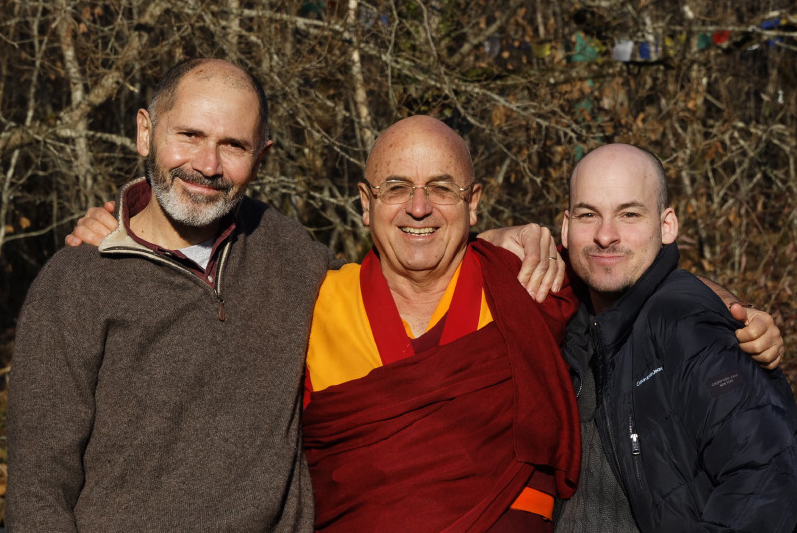
Matthieu Ricard is a Buddhist monk, a photographer, and a molecular geneticist who has served as an interpreter for the Dalai Lama.
Christophe André is a psychiatrist and one of the primary French specialists in the psychology of emotions and feelings.
Alexandre Jollien is a philosopher and a writer whose work has been attracting an ever-growing readership. Together, they are the authors of In Search of Wisdom and Freedom For All of Us.
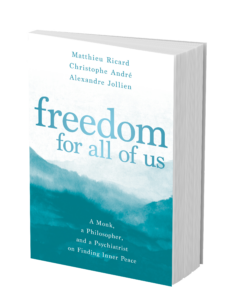
Learn More
Sounds True | Amazon | Barnes & Noble | Bookshop | IndieBound
The courage to be vulnerable – with Brené Brown
Dr. Brené Brown, a research professor at the University of Houston’s graduate college of social work, has spent the past decade studying vulnerability, courage, authenticity, and shame. Brené is the author of the #1 New York Times bestseller Daring Greatly, and with Sounds True she has created the audio learning course The Power of Vulnerability: Teachings on Authenticity, Courage, and Connection. In this episode of Insights at the Edge, Tami speaks with Brené about the cultural myth that equates vulnerability as weakness instead of recognizing it as the greatest measure of our courage. They also examine Brené’s research about the qualities that allow a person to live in a wholehearted way.
We hope you enjoy this audio session with Brené Brown! You can stream or download the recording at no cost here – or download the transcript if you’d like to read the discussion.

Give Yourself Permission to Take Up Space
Dearest Friend,
We live in a world full of deadlines. Alarms. Screaming kids. Nagging bosses. More on our to-do lists than we could accomplish in three lifetimes. It’s easy for your needs to get buried underneath the rubble of daily life, and figuring out how to reconnect with your authentic self can feel touch and go… at best.
I wrote Needy: How to Advocate for Your Needs and Claim Your Sovereignty to lovingly provide the space for you to better understand your needs, experiment with new habits that help you meet those needs each day, and build a resilient connection with yourself that you can rely upon for good.
You have needs—your needs matter. And yet, you’ve been taught that pushing your needs to the back burner is the only way to get things done, that your needs are an overwhelming burden, or that self-care is a luxury you can’t afford. But the presence of your needs is a fact and not a flaw. You can reclaim your energy and give yourself permission to take up space in the center of your own life.
In Needy, I share my unique approach to identifying, honoring, and advocating for the most tender and true parts of yourself that yearn to be acknowledged. It is an invitation to embody self-acceptance, which leads to meaningful growth in self-responsibility, self-care, self-trust, and self-love.
This book will be a delicious companion for your journey, but you actually can begin caring for yourself with greater tenderness and open communication right now.
I invite you to take the next three minutes to check in with yourself.
Put down your phone, close your computer, and put your hand on your heart.
Breath deeply into your belly and ask yourself:
How do I feel?
What do I need?
What does my body need from me?
What is ONE, doable need that I am ready, able, and willing to meet?
Real self-care is responsive, not prescriptive. The care you are aching for right now will be found in asking yourself those four questions. Give yourself permission to start with one, tangible action.
And repeat as necessary.
Need more? I will see you between the pages of Needy. I am so grateful to be able to share this book with you, and I hope you will share it with the humans in your life who struggle to take up space in this way.
xx Mara
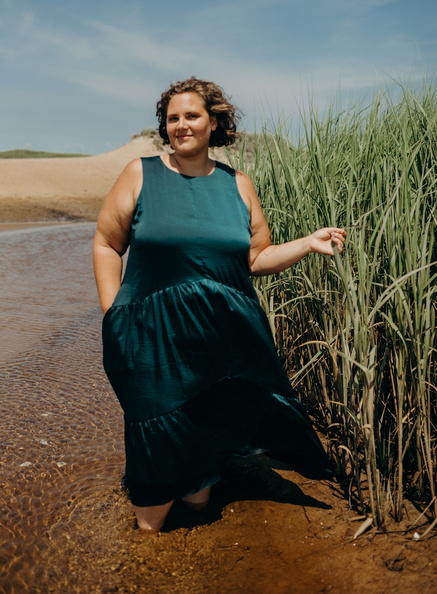
Mara Glatzel, MSW, (she/her) is an intuitive coach, writer, and podcast host. She is a needy human who helps other needy humans stop abandoning themselves and start reclaiming their humanity through embracing their needs and honoring their natural energy cycles. Her superpower is saying what you need to hear when you need to hear it, and she is here to help you believe in yourself as much as she believes in you. Find out more at maraglatzel.com.
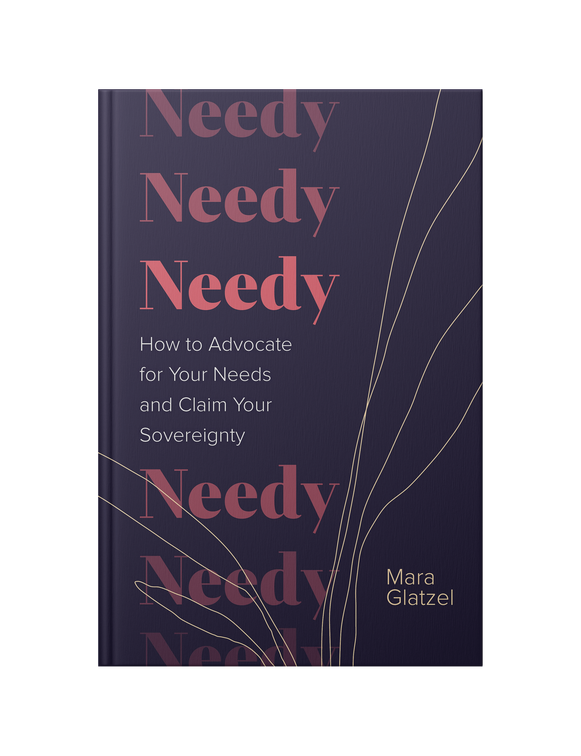
Learn More
Amazon | Barnes & Noble | Bookshop | Sounds True

